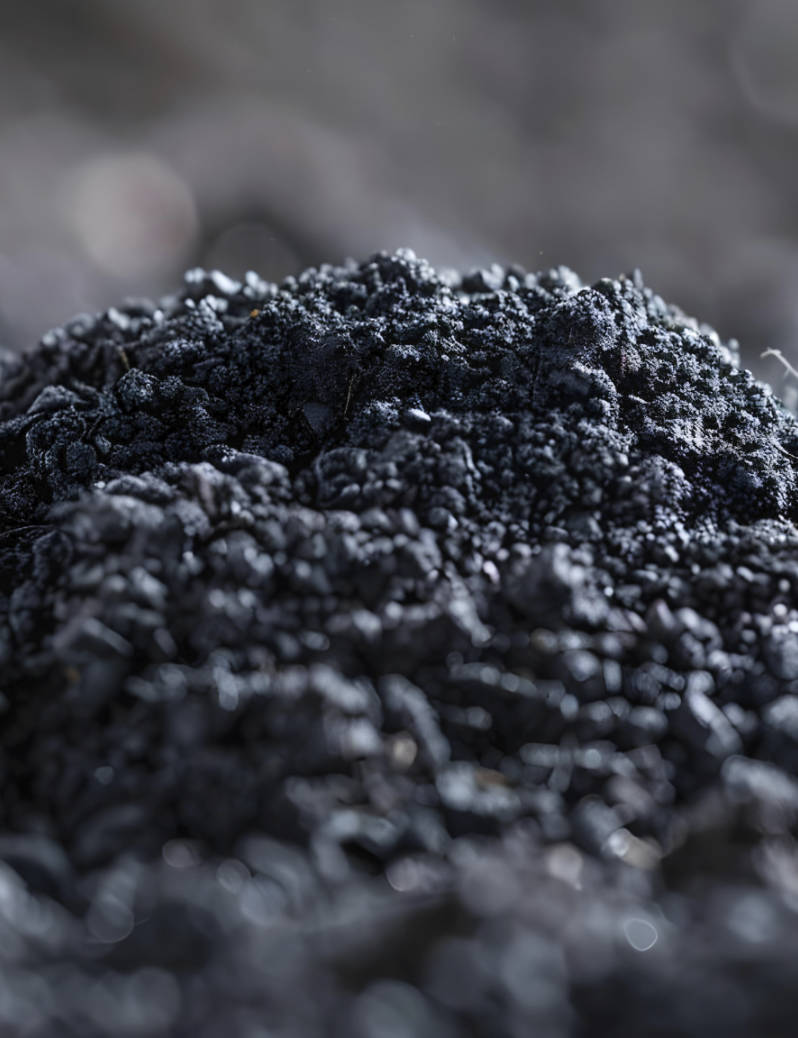
For slurry treatment and substrate carrier as a soil additive
78 - 92%
Carbon content
10 - 30%
Moisture
1 - 10 mm
Grain size
0.00006%
Total 16 EPA-PAK per kilogram
In order to guarantee a high quality standard and our purity requirement, no other substances are added.
Biochar as soil charcoal
More and more farms are using high-quality biochar specifically as a soil conditioner - with the aim of sustainably improving yield security, nutrient availability and soil life. Soil charcoal unfolds its full potential particularly on nutrient-poor, compacted or erosion-prone areas.
In practice, processed biochar, e.g. "charged" with liquid manure, compost or fermentation residues, acts as a permanent nutrient store, water reservoir and habitat for microorganisms. The results range from more stable yields and better root penetration to a much more lively soil.
Practical experience
1. higher yields and stable plant development
- Farmers report an average of 10-20 % higher yields, especially on sandy, degraded or heavily used soils.
- Earlier juvenile development and better tillering with Cereal crops such as wheat, maize and barley.
- Stronger rooting ensures better nutrient and water supply. Water supply for plants, especially during dry periods.
2. improved soil structure and water storage capacity
- Biochar loosens compacted soils and increases air and water permeability.
Water balance - especially on heavy loam or clay soils. - More water retention capacity: Particularly in dry years, more stable plant populations with better tolerance of Drought stress.
- Less erosion and siltation due to stabilized Floor units.
3. long-term nutrient storage and availability
- Biochar "charged" with liquid manure, compost or fermentation residues acts as a buffering nutrient store in the soil.
- Losses due to leaching (e.g. nitrogen, potassium, phosphorus) are reduced - more nutrients remain available to the plants.
- Higher efficiency of organic and mineral fertilization, which saves operating costs.
4. revitalized soil - promotion of soil life
- Due to its high porosity, biochar provides habitats for
Microorganisms, mycorrhiza and earthworms. - Visibly more earthworm population on biochar-treated Surfaces.
- Stronger humus formation because organic matter is better is stabilized.
5. climate protection & CO₂ binding
- Biochar is a permanent carbon sink: once introduced, it remains stable in the soil for centuries.
- Practical farms that use biochar can thereby reduce CO₂- certificates or improve their carbon footprint.
- Lower nitrous oxide emissions from the soil - a decisive advantage for climate-efficient agriculture.
6. economic added value
- Higher yields and reduced fertilizer losses lead to better contribution margins per hectare.
- Through cascading use (e.g. feed coal → manure → soil) the external nutrient requirement decreases.
- Less effort for soil cultivation (looser topsoil, better passability after rain).
Quality you can rely on
When using biochar in arable farming, maximum purity and quality are crucial for increasing yields and long-term humus build-up. The biochar produced in the Carbotec-1 reactor
erzeugte Biokohle, erreicht einen PAK-Gehalt von unter 0,2 – 0,6 mg/kg – einer der besten Werte am
Markt und deutlich unter dem Grenzwerten der geforderten Standards. Maximale Sicherheit für Ihre Böden und Erträge.

